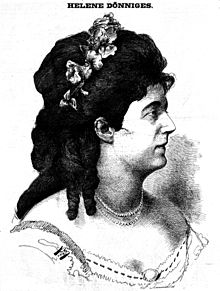Helene von Dönniges

Helene von Dönniges , also Helene von Döniges , widowed Helene von Racowitza , married. Helene Friedmann , married. Helene von Schewitsch , (born March 21, 1843 in Berlin ; † October 1, 1911 ) was a German writer and stage actress .
Life
Helene von Dönniges came in 1843 as the first of seven children of Wilhelm von Dönniges , at the time a diplomat in the service of Crown Prince Maximilian of Bavaria , and his wife Franziska, nee. Wolff, on the world. After her father lost his post at court, she lived with the family in Nice , where she became the queen of the ball and fell in love with Lieutenant Otto Paul von Krusenstern, the grandson of the researcher Adam Johann von Krusenstern . Her father forbade the connection and, after becoming engaged to Otto von Rennenkampf, sent Dönniges to her grandmother in Berlin at the end of 1861.
In Berlin, Dönniges became engaged to the young Wallachian Janco Gregor von Racowitza (Iancu Racoviţă), but canceled the engagement when she met Ferdinand Lassalle . In 1864 he was engaged to Lassalle, who was particularly hostile to her father. Dönniges finally turned away from Lassalle and revoked the engagement, whereupon Lassalle challenged her father to a duel. Helene's former fiancé Racowitza took over the duel for him for reasons of age, in which Lassalle von Racowitza was seriously injured and died three days later. The circumstances of the duel caused a sensation: For the socialists, Dönniges was the man's “murderer”, and the shooter Racowitza was prosecuted. In the summer of 1865 Racowitza and Dönniges married in Wallachia . Racowitza died in 1865 and was buried in Nice.
Dönniges went to Berlin to become an actress. On January 3, 1868, she married her teacher Siegwart Friedmann . But it wasn't until 1871 that she had her first appearance in the Schwerin court theater as "Susanne" in the last letter . From there, both made their way to Vienna , where Dönniges was less famous as an actress than through her past. Nevertheless, she worked at the Stadttheater Wien (inaugural role: "Countess Somerive" in Maria Magdalena ). After the divorce from Friedmann in the summer of 1873 “because of female peculiarities” she appeared under the name “Princess von Racowitza”. In 1874 she was portrayed in oil by Hans Makart . In 1875, meanwhile in Saint Petersburg , she married the socialist Sergei von Schewitsch. In 1877 the couple emigrated to America, where she worked as an actress and he worked for the New Yorker People's Daily . Because they missed the usual aristocratic lifestyle in America, the couple returned to Europe in 1890 and lived in Munich from 1892. Her husband became known as a man of letters, while Dönniges had devoted himself to theosophy and ghost vision, which she had already dealt with in America. She had also published several novels and her memories of the Lassalle affair.
She was famous in the Munich literary scene and in Schwabing and, as an early emancipated woman, was controversial. After 1905 the couple got into great financial difficulties, which drove Dönniges' husband to fraudulent bills and other crimes. However, his death on September 27, 1911 saved him from trial and conviction. Dönniges saw no way out and four days later took his own life with an overdose of morphine .
Works
- Inherited blood. Novel in two books, Berlin 1892
- Countess Vera. Novel in three parts, Munich 1882
- In maiorem dei gloriam, Berlin 1911
- My relationships with Ferdinand Lassalle, 1st edition Berlin 1879
- From others and me. Memories of all kinds, Berlin 1909
- Practical theosophical hints from an occultist, Leipzig 1904
- How I found myself External and internal experiences of an occultist, Berlin 1901
- The Secret Doctrine and the Beast Men in Modern Science, in: Lucifer-Gnosis, ed. v. Rudolf Steiner, H. 29.30,31, 1906
literature
- Ludwig Eisenberg : Large biographical lexicon of the German stage in the XIX. Century . Verlag von Paul List , Leipzig 1903, pp. 288 f., ( Textarchiv - Internet Archive ).
- Rácowitza, Helene von . In: Franz Brümmer: Lexicon of German poets and prose writers from the beginning of the 19th century to the present . Volume 5. Brockhaus, Leipzig 1913, p. 380.
- Schewitsch, Helene von . In: Elisabeth Friedrichs: The German-speaking women writers of the 18th and 19th centuries. A lexicon . Metzler, Stuttgart 1981, ISBN 3-476-00456-2 , (Repertories on the history of German literature 9), p. 267.
- Andrea Hirner: The death parcel beauty. Princess Helene von Racowitza - a Munich child abroad . Herbert Utz Verlag, Munich 2011, ISBN 978-3-8316-4038-6 .
- Hubert Kulick: Dönniges, Marie Josephine Helene, from ,. In: New German Biography (NDB). Volume 4, Duncker & Humblot, Berlin 1959, ISBN 3-428-00185-0 , p. 27 f. ( Digitized version ).
- Racowitzà-Schewitsch, Mrs. Helene von . In: Sophie Pataky (Hrsg.): Lexicon of German women of the pen . Volume 2. Verlag Carl Pataky, Berlin 1898, p. 162 ( digitized version ).
Web links
- Literature by and about Helene von Dönniges in the catalog of the German National Library
| personal data | |
|---|---|
| SURNAME | Dönniges, Helene von |
| ALTERNATIVE NAMES | Döniges, Helene von; Racowitza, Helene von; Friedmann, Helene; Schewitsch, Helene von |
| BRIEF DESCRIPTION | German writer and theater actress |
| DATE OF BIRTH | March 21, 1843 |
| PLACE OF BIRTH | Berlin |
| DATE OF DEATH | October 1, 1911 |
| Place of death | Munich |